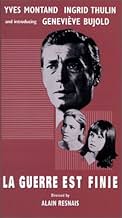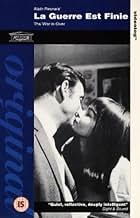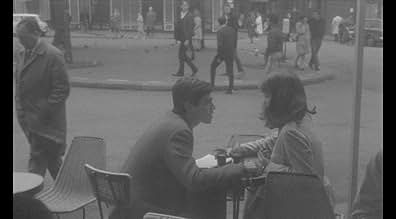La guerre est finie
- 1966
- Tous publics
- 2h 1min
NOTE IMDb
7,3/10
2,6 k
MA NOTE
De retour de mission à Paris dans les années soixante, un communiste espagnol est en proie au scepticisme. Il part à la recherche d'un camarade qui risque d'être arrêté s'il se rend en Espag... Tout lireDe retour de mission à Paris dans les années soixante, un communiste espagnol est en proie au scepticisme. Il part à la recherche d'un camarade qui risque d'être arrêté s'il se rend en Espagne et se rend compte qu'il a disparu.De retour de mission à Paris dans les années soixante, un communiste espagnol est en proie au scepticisme. Il part à la recherche d'un camarade qui risque d'être arrêté s'il se rend en Espagne et se rend compte qu'il a disparu.
- Réalisation
- Scénario
- Casting principal
- Nommé pour 1 Oscar
- 4 victoires et 4 nominations au total
Avis à la une
Alain Resnais was part of the so-called Left Bank of the French New Wave, alongside with Varda, Marker and Demy, who were politically much more aware compared to the film fanatics of Cahiers du Cinema (Rohmer, Truffaut, Rivette, Godard, Chabrol). Alain Resnais has always been interested in past but here he focuses on its impact with regards to the future. The War Is Over was his fourth feature, following Hiroshima mon amour, Last Year in Marienbad and Muriel, and still remains as one of the finest films of political cinema. The film builds around the theme of how to come to terms with one's past in order to live in peace with the present. No other place -- maybe Germany or Poland -- offers such a great setting for this but Spain because the shadows of the Civil War are so present. It is a milieu that has become the symbol of the war, so to speak.
Diego Mora (Yves Montad) is an old man who spent his youth as a revolutionary in the Spanish Civil War. Now, thirty years later, he's part of a group that wants to redeem the dreams of the revolution in Paris. All the members of the group are living in the past, and so is Diego. But soon he has a moment of realization and breaks himself away from the chains of illusion and decides to make a change. Thus, The War Is Over is really a story about a man who is living a lie. It tells, rather bleakly in a melancholy tone, about old communists who can't let go off the past.
The War Is Over might just be Resnais' most satisfying work when it comes to somewhat coherent viewing experience. It's his first film with a clear storyline which is relatively easy to follow even if the editing was deliberately (but not self-deliberate!) ambiguous and confusing. Resnais has succeeded perfectly to relay the flow of time. Moreover, through the character played by Yves Montand the viewer can understand the director's thoughts and emotions, no matter how shattered, because he holds the pieces together. It is he through whom the viewer constructs the big picture.
In The War Is Over memories are created for the future. Alain Resnais doesn't try to build the horrors of the past by newsreel footage. He relays the tragedy of the conditions by showing how people are still living in the past, how they are left with unredeemed dreams in their hands. The dream has died in Spain. Of course, Spain is still there but merely as a concrete place full of tourists. People don't understand each other. There is a major breakdown in the communication between the old and the new left. Both are dreaming of a revolution but in their own ways. The legacy of the past torments the protagonist. However, he is not only forced to recall the past endlessly but also to be unable to understand the present reality.
Diego Mora (Yves Montad) is an old man who spent his youth as a revolutionary in the Spanish Civil War. Now, thirty years later, he's part of a group that wants to redeem the dreams of the revolution in Paris. All the members of the group are living in the past, and so is Diego. But soon he has a moment of realization and breaks himself away from the chains of illusion and decides to make a change. Thus, The War Is Over is really a story about a man who is living a lie. It tells, rather bleakly in a melancholy tone, about old communists who can't let go off the past.
The War Is Over might just be Resnais' most satisfying work when it comes to somewhat coherent viewing experience. It's his first film with a clear storyline which is relatively easy to follow even if the editing was deliberately (but not self-deliberate!) ambiguous and confusing. Resnais has succeeded perfectly to relay the flow of time. Moreover, through the character played by Yves Montand the viewer can understand the director's thoughts and emotions, no matter how shattered, because he holds the pieces together. It is he through whom the viewer constructs the big picture.
In The War Is Over memories are created for the future. Alain Resnais doesn't try to build the horrors of the past by newsreel footage. He relays the tragedy of the conditions by showing how people are still living in the past, how they are left with unredeemed dreams in their hands. The dream has died in Spain. Of course, Spain is still there but merely as a concrete place full of tourists. People don't understand each other. There is a major breakdown in the communication between the old and the new left. Both are dreaming of a revolution but in their own ways. The legacy of the past torments the protagonist. However, he is not only forced to recall the past endlessly but also to be unable to understand the present reality.
This film has aged rather well considering that it's nearly 40 years old, that the concrete political situation(the Franco dictatorship in Spain)it was enmeshed in has disappeared, and that the musical score, the very mannered montage, and the sex scenes are all hopelessly dated and stilted. What gives this film its vitality is the screenplay written by Jorge Semprun, and it resonates today as well as it did in the mid-60s. Semprun had just written his classic, "The Long Voyage", in 1963, and the crisp trenchancy of his narrative style is just as evident in this film as it was in that story of his 1944 voyage to Buchenwald as a captured fighter of the French Resistance. Though we may not feel any longer the need to reassess the strategy of how to overthrow Franco, we still know what it's like to feel you're at the end of the rope with no place to leap to (both politically and psychologically). What Semprun reminds us, both in this film and in "The Long Voyage," is that it's the opportunities to experience solidarity with and support for others over the course of the journey that matters in the end.
10hhs-3
CAUTION: NOTES ON PLOT INCLUDED
Well, if you think this movie is about hot sex and Franco, then you could stick to Hemingway. A stunning psychodrama about a man who has seen his life burned out after decades of fighting a "good" but hopeless war, recognizes the futility, and sees another generation committing itself to figurative and literal suicide. Does he stop them? Join them? Can he have any effect at all? Does he try? See the movie. If you're into political drama a la Frankenheimer, Zinnemann, or Costa Gavras, this one is a "ten."
But you're right about Genevieve Bujold. Are you ever 8-)
Well, if you think this movie is about hot sex and Franco, then you could stick to Hemingway. A stunning psychodrama about a man who has seen his life burned out after decades of fighting a "good" but hopeless war, recognizes the futility, and sees another generation committing itself to figurative and literal suicide. Does he stop them? Join them? Can he have any effect at all? Does he try? See the movie. If you're into political drama a la Frankenheimer, Zinnemann, or Costa Gavras, this one is a "ten."
But you're right about Genevieve Bujold. Are you ever 8-)
Deleuze indicates that Resnais is one of the greatest political film-makers in the West, in modern cinema. According to him, this greatness comes from that they know how to show how people are what is missing, what is not there instead of presence of the people. Also, this film is related to a Spain that will not be seen: do the people in the old central committee stand with the young tereosits or the tired militant?
"La Guerre est Finie" aka The War is Over (1966) from French master Alain Resnais, is a taut intellectual yet very much visual thriller. Yves Montand is in his mature prime, and Ingrid Thulin so quietly sensual, while Geneviève Bujold gave an impressive debut performance. Resnais' creative cinematic approach in rich visual play mixed with voice-over narration, aptly intensified the suspense. We're literally inside Montand's character Diego's head - thinking with him, seeing through his eyes, having memory tracking along with him in either flash back or flash forward. We feel Thulin's subtle moves as Marianne - a slight turn of her head, gentle extension of her neck, every movement so delicately modest yet sensual in volumes. Bujold's Nadine has such delicious youthful verve befitting the character - she is the exciting accent. Thulin and Bujold each has an intimate segment opposite Montand delivered in Resnais' unique and refreshing points of view. It is cinematic nuance truly savory and appreciation optimal.
Cinematography in black and white by Sacha Vierny is poignantly appropriate - suspense would probably be lessen if delivered in color. Music score by Giovanni Fusco further ensured the distinctive quality of this film. You can tell this is no Hollywood thriller formula. In fact, the film can very well be a character study of Diego or a visual journey through the interplay of character relationships, yet it's suspenseful nonetheless. The beginning segment with veteran actor Michel Piccoli as the shrewd custom inspector questioning Montand's Diego certainly is tense as any other spy thriller yarn.
The war in the title can very well be within Diego: to decide whether to continue this life of 'professional revolutionary' or to start anew a 'normal' life with Marianne. The dilemma also carries over to Marianne: to decide to stay in Paris or love conquers all in pursuit after Diego (to the point of being a matter of life and death, indeed). "The War is Over" may seem complex, but it's actually an easier to follow film than other Resnais endeavors. Give it a try. It's available on DVD. Caution: do ignore the dubbed in English alternative - it would not be the real thing, definitely non-flavorful. Experience the film in French with English subtitles.
Cinematography in black and white by Sacha Vierny is poignantly appropriate - suspense would probably be lessen if delivered in color. Music score by Giovanni Fusco further ensured the distinctive quality of this film. You can tell this is no Hollywood thriller formula. In fact, the film can very well be a character study of Diego or a visual journey through the interplay of character relationships, yet it's suspenseful nonetheless. The beginning segment with veteran actor Michel Piccoli as the shrewd custom inspector questioning Montand's Diego certainly is tense as any other spy thriller yarn.
The war in the title can very well be within Diego: to decide whether to continue this life of 'professional revolutionary' or to start anew a 'normal' life with Marianne. The dilemma also carries over to Marianne: to decide to stay in Paris or love conquers all in pursuit after Diego (to the point of being a matter of life and death, indeed). "The War is Over" may seem complex, but it's actually an easier to follow film than other Resnais endeavors. Give it a try. It's available on DVD. Caution: do ignore the dubbed in English alternative - it would not be the real thing, definitely non-flavorful. Experience the film in French with English subtitles.
Le saviez-vous
- AnecdotesScreenwriter Jorge Semprún's life and work as a member of the central committee of the Spanish Communist party from 1954 to 1965 are the basis of the character Diego Mora played by Yves Montand actions and thoughts in 'La Guerre est finie'.
- ConnexionsReferenced in What's My Line?: Yves Montand (2) (1967)
Meilleurs choix
Connectez-vous pour évaluer et suivre la liste de favoris afin de recevoir des recommandations personnalisées
- How long is The War Is Over?Alimenté par Alexa
Détails
- Date de sortie
- Pays d’origine
- Langues
- Aussi connu sous le nom de
- The War Is Over
- Lieux de tournage
- Boulevard Saint-Germain, Paris 6, Paris, France(tailing the young man at Metro Maubert)
- Sociétés de production
- Voir plus de crédits d'entreprise sur IMDbPro
- Durée
- 2h 1min(121 min)
- Couleur
- Mixage
- Rapport de forme
- 1.66 : 1
Contribuer à cette page
Suggérer une modification ou ajouter du contenu manquant






























